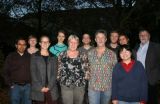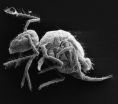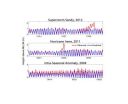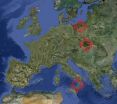(Press-News.org) Philadelphia, PA, November 27, 2012 – Posttraumatic stress disorder (PTSD) is a form of learning that begins at the moment of the exposure to extremely stressful situations and that grows in impact as trauma-related memories are rehearsed and strengthened repeatedly. This somewhat oversimplified view of PTSD yields a powerful prediction: if one could disrupt the rehearsal and strengthening of traumatic memories, a process called reconsolidation of memories, then one might reduce PTSD risk or PTSD severity after potentially traumatic events.
To be certain, it is tricky to attempt to alter traumatic memory reconsolidation. In fact, some early strategies for "trauma debriefing" turned out to strengthen rather than diminish posttraumatic learning.
Despite these challenges, a new study by Dr. Barbara Rothbaum and colleagues reports that a behavioral intervention delivered to patients immediately post-trauma is effective at reducing posttraumatic stress reactions.
"PTSD is a major public health concern," said Rothbaum, professor in Emory's Department of Psychiatry and Behavioral Sciences. "In so many people, what happens immediately after a traumatic event can make things worse or better. Right now, there are no accepted interventions delivered in the immediate aftermath of trauma."
To conduct the study, the researchers approached patients who presented to the local emergency room due to a traumatic event, including rape, car accident, or physical assault. Half of those who agreed to participate received the behavioral intervention, which was started immediately, while the other half did not. All patients were repeatedly assessed for symptoms of depression and stress over a twelve-week period.
The intervention is a modified form of exposure therapy in which a survivor confronts anxiety about a traumatic event by recounting it. Administered over the course of 3 1-hour sessions, the goal is to alter the person's thoughts and feelings about the traumatic event. Trained therapists asked the participants to describe the trauma they just experienced and recorded the description. The patients were instructed to listen to their recordings every day. The therapists also helped the patients look at obtrusive thoughts of guilt or responsibility, and taught them a brief breathing relaxation technique and self care.
They found that the intervention was safe, feasible, and successful at reducing posttraumatic stress reactions, compared to those who were assigned to the assessment-only condition, at 4 and 12 weeks post-injury.
"This study provides an elegant and clinically important test of the trauma reconsolidation hypothesis," commented Dr. John Krystal, editor of Biological Psychiatry.
The implications of this study are immense, Rothbaum explained. "If we know what to do, then we can train emergency workers to intervene with patients on a large scale. In addition to being implemented in the emergency room, it can help on the battlefield, in natural disasters, or after criminal assaults."
She concluded, "More research is needed, but this prevention model could have significant public health implications. A long-standing hope of mental health research is to prevent the development of psychopathology in those at risk instead of being limited to symptom treatment after disease onset."
###
The article is "Early Intervention May Prevent the Development of Posttraumatic Stress Disorder: A Randomized Pilot Civilian Study with Modified Prolonged Exposure" by Barbara Olasov Rothbaum, Megan C. Kearns, Matthew Price, Emily Malcoun, Michael Davis, Kerry J. Ressler, Delia Lang, and Debra Houry (doi: 10.1016/j.biopsych.2012.06.002). The article appears in Biological Psychiatry, Volume 72, Issue 11 (December 1, 2012), published by Elsevier.
Notes for editors
Full text of the article is available to credentialed journalists upon request; contact Rhiannon Bugno at +1 214 648 0880 or Biol.Psych@utsouthwestern.edu. Journalists wishing to interview the authors may contact Kathi Baker at +404 727 9371 or kobaker@emory.edu.
The authors' affiliations, and disclosures of financial and conflicts of interests are available in the article.
John H. Krystal, M.D., is Chairman of the Department of Psychiatry at the Yale University School of Medicine and a research psychiatrist at the VA Connecticut Healthcare System. His disclosures of financial and conflicts of interests are available here.
About Biological Psychiatry
Biological Psychiatry is the official journal of the Society of Biological Psychiatry, whose purpose is to promote excellence in scientific research and education in fields that investigate the nature, causes, mechanisms and treatments of disorders of thought, emotion, or behavior. In accord with this mission, this peer-reviewed, rapid-publication, international journal publishes both basic and clinical contributions from all disciplines and research areas relevant to the pathophysiology and treatment of major psychiatric disorders.
The journal publishes novel results of original research which represent an important new lead or significant impact on the field, particularly those addressing genetic and environmental risk factors, neural circuitry and neurochemistry, and important new therapeutic approaches. Reviews and commentaries that focus on topics of current research and interest are also encouraged.
Biological Psychiatry is one of the most selective and highly cited journals in the field of psychiatric neuroscience. It is ranked 5th out of 129 Psychiatry titles and 16th out of 243 Neurosciences titles in the Journal Citations Reports® published by Thomson Reuters. The 2011 Impact Factor score for Biological Psychiatry is 8.283.
ABOUT ELSEVIER
Elsevier is a world-leading publisher of scientific, technical and medical information products and services. The company works in partnership with the global science and health communities to publish more than 2,000 journals, including The Lancet and Cell, and close
to 20,000 book titles, including major reference works from Mosby and Saunders. Elsevier's online solutions include SciVerse ScienceDirect, SciVerse Scopus, Reaxys, MD Consult and Nursing Consult, which enhance the productivity of
science and health professionals, and the SciVal suite and MEDai's Pinpoint Review, which help research and health care institutions deliver better outcomes more cost-effectively.
A global business headquartered in Amsterdam, Elsevier employs 7,000 people worldwide. The company is part of Reed Elsevier Group PLC, a world-leading publisher and information provider, which is jointly owned by Reed Elsevier PLC and Reed Elsevier NV. The ticker symbols are REN (Euronext Amsterdam), REL (London Stock Exchange), RUK and ENL (New York Stock Exchange).
Media contact
Rhiannon Bugno
Editorial Office
+1 214 648 0880
Biol.Psych@utsouthwestern.edu END
In a new study published in the scientific journal Circulation, scientists at Karolinska Institutet and Karolinska University Hospital in Sweden show that an enzyme called arginase might have a key part to play in the development of cardiovascular disease in patients who already have type II diabetes. According to the team, arginase prevents the formation of protective nitrogen oxide in the blood vessels, and treatments that inhibit this enzyme reduce the risk of angina in diabetics.
"The fact that we could demonstrate the presence of arginase in several types of cell ...
Malaria is a life-threatening disease that strikes more than 200 million people every year – mainly in Africa, Asia and Latin America. The disease is caused by the Plasmodium parasite, which is spread by infected mosquito bites. Today, malaria can be prevented and successfully treated, but more than half a million people nevertheless die every year from the disease.
Large-scale monitoring and treatment programmes during the past decade have reduced the distribution of the disease, and the frequency of actual epidemics has fallen. However, the number of malaria patients ...
Field and laboratory work by a group of zoologists led by Omar Torres-Carvajal from Museo de Zoología QCAZ, Pontificia Universidad Católica del Ecuador, has resulted in the discovery of a new species of blunt-headed vine snake from the Chocoan forests in northwestern Ecuador. This region is part of the 274,597 km2 Tumbes-Chocó-Magdalena hotspot that lies west of the Andes. The study was published in the open access journal ZooKeys.
Blunt-headed vine snakes live in an area comprising Mexico and Argentina, and are different from all other New World snakes in having a very ...
A team of scientists from the University of Navarra and the Catalan Association of Biospeleology have discovered three new collembolan species in the Maestrazgo caves in Teruel, Spain. Their description has been published in the Zootaxa journal. These minute animals belong to one of the most ancient animal species on the planet.
The Maestrazgo caves in Teruel are located in a region of the Iberian Range where fauna has not been the subject of much study. It is a very isolated region since its average altitude is between 1,550 m and 2,000 m asl and its climate can be described ...
Researchers at the University of Liverpool have developed a computer-based test that could help heavy drinkers reduce their alcohol consumption.
Regular heavy drinking can lead to serious health conditions such as liver and heart disease, costing the NHS millions of pounds every year. Research at Liverpool has shown that the habit of consuming alcohol can be interrupted when people practice methods of restraint whenever they see images of alcoholic drinks.
The team developed a computer test that required participants to press particular buttons when an image of alcohol ...
Uncertainty about how much the climate is changing is not a reason to delay preparing for the harmful impacts of climate change says Professor Jim Hall of the Environmental Change Institute at the University of Oxford and colleagues at the Tyndall Centre for Climate Change Research, writing today in Nature Climate Change.
The costs of adapting to climate change, sea-level and flooding include the upfront expenses of upgrading infrastructure, installing early-warning systems, and effective organisations, as well as the costs of reducing risk, such as not building on flood ...
The effects of storm surge and sea-level rise have become topics of everyday conversation in the days and weeks following Hurricane Sandy's catastrophic landfall along the mid-Atlantic coast.
Ongoing research by professor John Brubaker of the Virginia Institute of Marine Science is throwing light on another, less-familiar component of sea-level variability—the "intra-seasonal" changes that occupy the middle ground between rapid, storm-related surges in sea level and the long-term increase in sea level due to global climate change.
"These are cases when the water is ...
Chromosome number is the most basic feature concerning the genome of a species, and it is known for about one third of higher plant species. In particular, for plants of Italy, Slovakia, and Poland, online chromosome number databases have been developed: 'Chrobase.it – Chromosome numbers for the Italian flora', 'Karyological database of ferns and flowering plants of Slovakia' and 'Chromosome number database – PLANTS', respectively. The three datasets account for about 35%, 60% and 40% of the whole floras, respectively.
"We used these datasets to compare chromosome number ...
MANHATTAN, Kan. -- When it comes to stopping illness, social media posts and tweets may be just what the doctor ordered.
A Kansas State University-led research team is looking at social media as a tool to reduce and prevent diseases from spreading. Researchers are studying whether a well-timed post from a public authority or trustworthy person could be as beneficial as flu shots, hand-washing or sneezing into an elbow.
"Infectious diseases are a serious problem and historically have been a major cause of death," said Faryad Sahneh, Kansas State University doctoral candidate ...
Athens, Ga. – Researchers at the University of Georgia have discovered that a virus commonly found in dogs may serve as the foundation for the next great breakthrough in human vaccine development.
Although harmless in humans, parainfluenza virus 5, or PIV5, is thought to contribute to upper respiratory infections in dogs, and it is a common target for canine vaccines designed to prevent kennel cough. In a paper published recently in PLOS ONE, researchers describe how this virus could be used in humans to protect against diseases that have eluded vaccine efforts for decades.
"We ...





